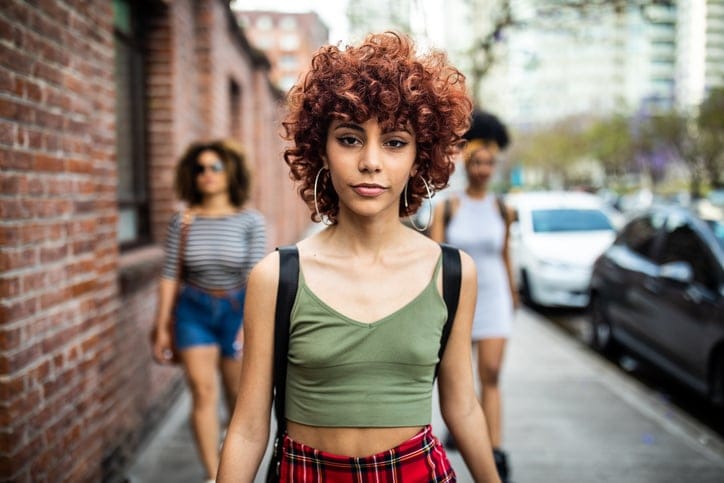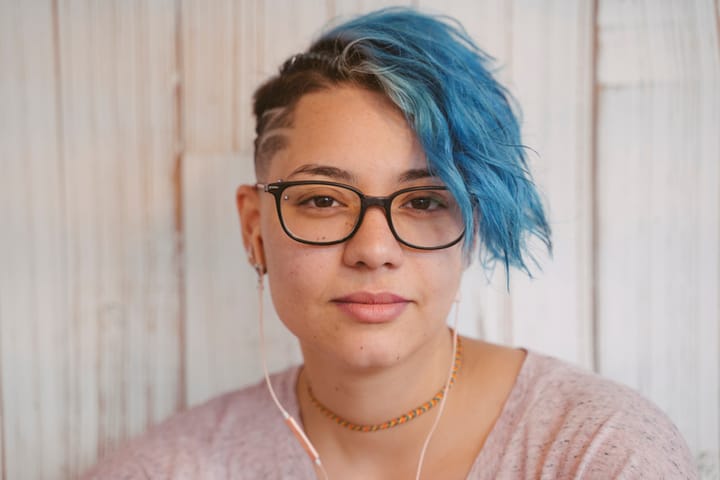Sexuality exists on a spectrum and most people don’t fall at the extreme end of either side. I identify as bisexual, meaning I’m attracted to and have relationships with both men and women. I don’t hide my sexuality but I also don’t define myself by it. That’s why it annoys me when people try to invalidate my bisexual identity because I happen to mostly date men. If I say I’m bisexual, I am. End of story.
- Who I find attractive is none of your business. Would a straight person be expected to prove just how attractive they found the opposite sex in order to be allowed to identify as a straight person? Straight people want to know that people who are different actually look different so they feel in control. But that plays into a harmful erasure of bisexual people who date members of the opposite sex. On the surface, a relationship might pass as a straight couple but there could be any combination of trans relationships or asexual, bisexual, gender non-conforming identities floating around.
- My bisexual identity is not limited by your perception of it. It’s much more nuanced than just dyeing my hair or getting a new outfit. It can be a struggle to pursue the relationships that interest you while facing this pressure to look a certain way when the people who we’re trying to pander to are the people who don’t really understand our experience as a community at all. Straight people are the reason we have and need labels.
- Self-expression is about me. My identity as a bisexual person is about me, and the result of my feelings and emotional standings. It doesn’t change with who I’m seeing because I am the common denominator. My identity is agnostic of what you think it should be, so take a step back.
- I feel good and that’s the important thing. If I’m happy in a relationship, that’s all that matters. I am my own person and my own identity. No one, whether a stranger or a partner, will change that against my wishes. That’s why other people’s perceptions of my “straight passing” relationship don’t bother me. I know me.
- A relationship doesn’t always equal exclusivity. When straight people invalidate my bisexual identity (and others’) by making assumptions, they also reveal their own basic relationships. Queer people are more open to polyamory, three-ways, and non-monogamous relationships. This spirit of experimentation isn’t as encouraged among straight relationships. Therefore, even though I date mostly men, that doesn’t mean I’m not getting down and dirty on the side with women. But people can’t see below the surface. They just want to judge.
- Labels are for straight people. They’re the default relationship type. They’re the reason why people get married, move in, and have kids because that’s the framework in order to make a family in the “right” way. But, as a member of the queer community, that isn’t our experience. We’re rejected by people who use these labels to more accurately charge us with sin.
- Sexuality is a spectrum. We know in the queer community that sexuality is fluid and can change over time. This understanding takes patience, self-understanding, and a spirit of openness, but other people don’t understand. Society likes to fix people in place in binary, limiting categories that simplify our personality into a single noun. That erases the complexity of sexuality and how we present ourselves.
- My bisexual identity is strong. I have grown into my sexuality and am excited to see how I mature and evolve over time, but before, I was stressed about finding the perfect, permanent title. I will not be trapped by other people’s need to know what I am. I cannot be invalidated even though I might present as straight in their eyes. That’s their problem.
- Biphobia is real. That’s why, when people see bisexual relationships and presume that they are straight, it can be invalidating their queer relationship and the real struggle that it entails sometimes. With time, I’ve grown a thicker skin, but people who are just coming out don’t deserve that careless bigotry. We need to make this form of bisexual representation more prominent in media so that we can change the assumption that everyone passing as a straight couple is one. This means that members of the queer community need to also step up and support media that isn’t just about two girls falling in love.
- We’re all a little queer. I know this is easy to say, but it seems impossible as a queer person that other people can think they’re totally, 100% straight. We all look at objectively attractive people, whoever they are, and think, whoa, they’re hot. It doesn’t mean anything, but to limit yourself so much, and be so absolute. That’s a sorry life to live.
- I won’t “earn” my queerness. Not for other people. I won’t date a girl and dump my boyfriend just to make other people comfortable. I think it’s brave to claim my queerness and know myself and my partner to such an extent that I confuse people. My feelings will come above other people’s misconceptions – it’s not my job to educate them.
- Sometimes, hate comes from within the community. I’ve received hate from both inside and outside our community, so I have a very resilient sense of my bisexual identity. I trust myself because I’ve faced questions from all sides. Some think I’m too queer, while others think I’m not queer enough or faking it. You can try to invalidate my identity, but it won’t work. I know myself, you don’t.
- I’m not afraid of my future. Straight people have lots of pressures on them to get engaged, move in, and have two and a half kids before they’re 30 to make a family the “real way.” How does that even make sense? As a queer person, I can claim and direct more of my future because, while it isn’t included in that social pattern, it’s also liberated from it. It means I can have a relationship less likely to be rushed by other people’s milestones.
- I am patient with myself. I also know we all make mistakes, and we all have failed experiments, and that’s okay. We all have learning opportunities that we can use to find the best, happiest version of ourselves. That’s why dating men doesn’t invalidate my identity. If I didn’t try it, because I was scared about seeming “straight,” then I wouldn’t be this happy.
- “Because I say so” is a good enough answer. And it always will be. I feel like a haggard mother at the end of the summer holidays, but it’s true. ‘Because I said so’ is a complete sentence, and I don’t owe anyone else any more information.
- My identity is more than your insecurity. This goes out to the ignorant straight women, the closeted gay bullies, and the overzealous gold star lesbians. My bisexual identity isn’t the punching bag for all of your insecurities or homophobia. Sort yourself out and leave me alone.




